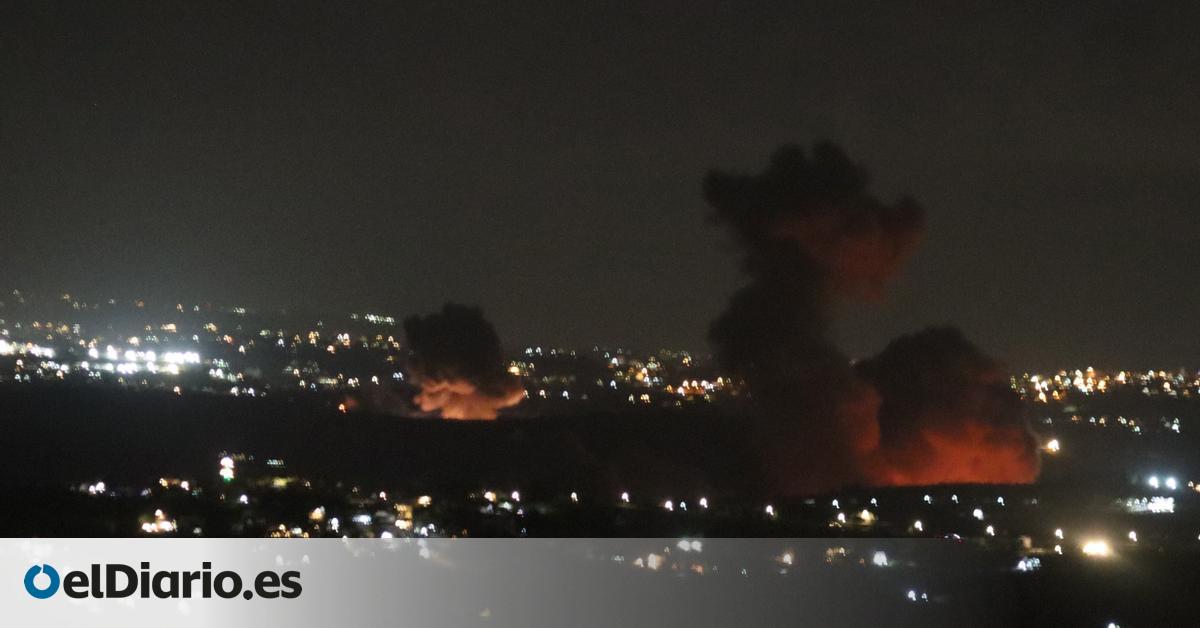
The escalation of tensions in the Middle East continues. The Israeli army announced on Sunday that it is attacking Hezbollah targets in Lebanon, after detecting the launching of “150 rockets, cruise missiles and drones” by the Shiite group towards northern Israel in the last few hours. Israel has acknowledged that Hezbollah rockets have reached “farther than ever” in its territory and that its response, which has hit nearly 400 positions of the militia in Lebanon, has prevented an even larger attack.
The Lebanese group has claimed responsibility for the attacks on Sunday morning and Saturday night against the Haifa area, where the authorities have suspended classes, and for the attack on an Israeli weapons factory and a military base. At least two people have been slightly injured and one is in moderate condition after being hit by shrapnel in the area, said the Israeli emergency service Magen David Adom (MDA).
Hezbollah said the attacks were an “initial response” to explosions of thousands of the group’s communications devices this week, which were blamed on Israel and left more than 30 fighters dead. Israel, for its part, said that “the army’s attacks will continue and intensify,” according to a statement from the country’s defence forces.
Israeli Prime Minister Benjamin Netanyahu sent a threatening message to Hezbollah on Sunday, warning that if it has not yet “understood the message, I promise you that it will.” Without making explicit reference to the attacks of recent days, which included the targeting of members of the Shiite militia across Lebanon by blowing up their pagers, radios and walkie-talkies, Netanyahu said that “we have inflicted on Hezbollah a sequence of blows that it could not have imagined.”
Like Netanyahu, the Israeli army’s spokesman for the international press, Nadav Shoshani, regretted that thousands of children in northern Israel were unable to go to school today, shortly after the start of the school year, due to Hezbollah’s attacks, and pointed out that some 60,000 people are still living in evacuations since October, which he described as “intolerable.” “Hezbollah is responsible for the situation we are in. They started this, without provocation, on October 8,” the spokesman said.
The escalation of tensions beyond the borders of the Gaza Strip, with attacks between Israel and Lebanon, as well as the possible involvement of other militias from Iraq, has raised fears that the conflict with Hamas could spread to the entire Middle East. Reuters reports that a leader of the Islamic Resistance in Iraq has announced “a new phase” in his support work: “An escalation in Lebanon means an escalation from Iraq.”
Israeli President Isaac Herzog said on Sunday on British television Sky News that his government “does not want a war” with Lebanon. Herzog said that the increase in tensions in recent weeks “has been instigated” by Iran’s partners in the region, from Hamas in Gaza to Hezbollah in Lebanon or the Houthis in Yemen. “Israel is fighting for its survival, for its existence and that of its citizens,” added Herzog.
This weekend’s airstrikes come just 48 hours after Israel killed at least 16 Hezbollah fighters in Beirut, including Commander Ibrahim Aqil, the group’s operations chief on a US warrant, and three other special forces officers. Three children and seven women were also killed in the attack, according to Lebanese authorities.
“With the region on the brink of imminent catastrophe, it cannot be overemphasized that there is NO military solution that will ensure greater security for either side,” UN Special Coordinator in Lebanon Jeanine Hennis-Plasscharet said in a message on X.
Hospitals move their operations
The situation raises fears of outbreak of open war in the region, despite Hezbollah’s warning that it does not want to enter into a large-scale conflict and that its attacks would cease if a ceasefire agreement were reached in Gaza.
The latest attacks on the border with Lebanon have prompted hospitals in northern Israel to reduce their activity and move their operations to fortified areas. The Israeli Ministry of Health has ordered all hospitals near the border to move their activity to fortified areas and to cancel elective surgeries, after the Israeli military issued new orders for civilians in northern communities.
The guidelines limit outdoor gatherings to a maximum of 10 people and indoor gatherings to 100 until Monday, and require workplaces to conduct business near air raid shelters. Beaches and schools have also been closed.

Israeli army temporarily closes Al Jazeera offices in West Bank
Al Jazeera TV reported on Sunday that heavily armed Israeli soldiers had seized and destroyed equipment at the outlet’s offices in Ramallah, West Bank. “The soldiers are confiscating the equipment even though the order only refers to the closure of the office,” said the head of the office, Walid al-Omari.
The network, known for its coverage of hospital bombings, attacks on residential buildings and the killing of unarmed civilians in Gaza, also reported that during the raid soldiers tore down a poster of journalist Shireen Abu Akleh, who was killed two years ago by an Israeli soldier while covering a military raid in the West Bank. The raid sparked international condemnation and heightened tensions between Israel and the channel.
The government media office in Gaza has strongly condemned the Israeli military’s decision to close Al Jazeera’s offices in Ramallah, calling it a “crime and a clear violation of international law.” In a statement posted on Telegram, they said the decision reflects “the weakness and fragility of the Israeli narrative in the face of the truth and facts on the ground.”
Beirut death toll rises to 45
Meanwhile, Lebanese authorities on Sunday raised to 45 the death toll from last Friday’s Israeli bombing of a building where leaders of the elite Hezbollah force were meeting in a southern suburb of Beirut.
The Lebanese Ministry of Public Health’s Public Health Emergency Operations Centre announced in a statement a new death toll from the bombing, which completely destroyed a residential building and left an initial death toll of 37, including at least a dozen Hezbollah members.
The search for bodies or survivors is still underway, while Lebanese authorities say DNA tests have begun to determine the identities of the remains found in the rubble of the ten-storey building, which was located in the southern suburb of Dahye, a Hezbollah stronghold.
Source: www.eldiario.es

